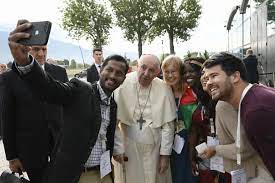Pope Francis met in Assisi (Italy) with young economists and businessmen at the 1st face-to-face meeting of the “Economy of Francis”, an event in which he recalled the urgency of developing an economy that respects the environment and puts the poor in the middle.
“As I find myself in the city of San Francisco, I can’t stop talking about poverty. Developing an economy inspired by it means committing ourselves to putting the poor at the center. Starting with them, we look at the economy; from them, we look at the world”, said Pope Francis on 24 September during his address to young people.
The Holy Father recalled that “there is no ‘Economy of Francis’ without respect, care and love for the poor, for each fragile and vulnerable person – from conception in the womb to the disabled patient, even the elderly in difficulty–”.
“I would go even further: a Francis economy should not be limited to working for or with the poor. As long as our system ‘produces’ discards, and we operate according to this system, we will be complicit in an economy that kills,” he said.
During the meeting held at the Lyrick Theater in Assisi with people from more than 100 countries, the Pope told them that “with God’s help” and seeing the same call in other young people, they will be able to “change a huge and complex system like the World economy”.
“Our generation has left them a rich heritage, but we have failed to protect the planet and we are not ensuring peace. They are called to become artisans and builders of our common home, a common home that is “falling into ruin.”
The Pontiff reminded them that a “new economy inspired by Francis of Assisi can and must become an economy of friendship with the earth and an economy of peace.”
“There are many people, companies and institutions that are carrying out an ecological reconversion. We have to continue on this path and do more. The earth burns today, and today we must change, at all levels”, he assured.
At Papa he also referred to the need to abandon fossil fuels and to make sacrifices in lifestyles that “remain unsustainable”.
The Pope explained to those present that not all environmental solutions have the same effects on the poorest, so “those that reduce misery and inequality should be preferred.”
“As we seek to save the planet, we must not neglect those who suffer. Carbon dioxide is not the only pollution that kills; inequality also fatally harms our planet”, he stressed.
The Pope recalled the figure of Saint Francis of Assisi, who “loved not only the poor but also poverty itself.”
“Francis went to the lepers not so much to love them but because he wanted to become poor like them. Following Jesus Christ, he stripped himself of everything to become poor with the poor. In fact, the first market economy was born in the thirteenth century in Europe through daily contact with the Franciscan friars, friends of the first merchants.
“That economy certainly created wealth but it did not despise poverty. Our capitalism, on the other hand, wants to help the poor but does not respect them; does not understand the paradox of beatitude: ‘Blessed are the poor’ (cf. Lk 6:20)”, he added.
In this sense, Pope Francis urged to combat poverty “creating decent work.”
“All of us, including businessmen and economists, must begin: living the evangelical paradoxes of Francis,” he emphasized.
“In medieval times, the Franciscan movement was able to create the first economic theories and even the first banks for the needy (“Monti di Pietà”), because it looked at the world with the eyes of the poorest of the poor,” the Pope added.
The Holy Father assured young people that “it will improve the economy if you look at things from the perspective of the victims and the discarded.”
“In order to have the eyes of the poor and of the victims, it is necessary to know them, to be their friends. And believe me, if you make friends with the poor, you will share their life, you will have a share in the Kingdom of God because Jesus said that the Kingdom of God belongs to them”, he said.
At the end of his speech, the Pope recalled that “without decent work and fair remuneration, young people will not become real adults and inequality will increase.”
“It is possible, sometimes, that a person survives without a job but does not live well. So while you create goods and services, don’t forget to create work, good work and work for all”, he concluded.
At the end of the meeting, Pope Francis proceeded to read and sign the “pact” of the Francis Economy, and gave a final prayer before returning to the Vatican.
The final prayer of the meeting “Economy of Francis”
“Father, we ask your forgiveness for having damaged the earth, for not having respected indigenous cultures, for not having valued and loved the poorest of the poor, for having created wealth without communion. Living God, who with your Spirit has inspired the hearts, hands and minds of these young people and has sent them on the path to the promised land, look kindly on their generosity, their love and their desire to dedicate their lives to a great ideal. Bless them in their companies, studies and dreams; accompany them in their difficulties and sufferings, help them to transform their difficulties and sufferings into virtue and wisdom. Support his longing for good and for life, lift him up in the face of disappointments due to bad examples, let him get discouraged but instead continue on his way. You, whose only begotten Son became a carpenter, grant them the joy of transforming the world with love, ingenuity and hands. Amen”.



